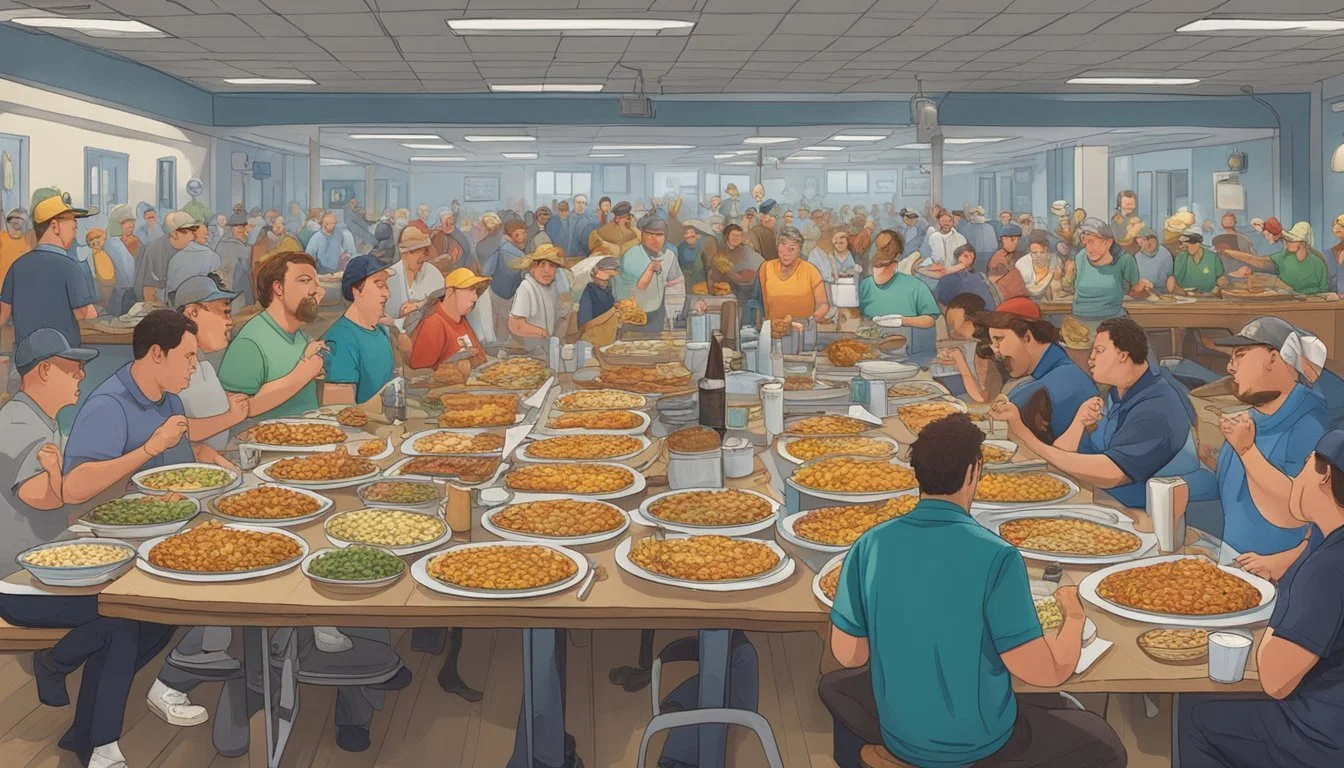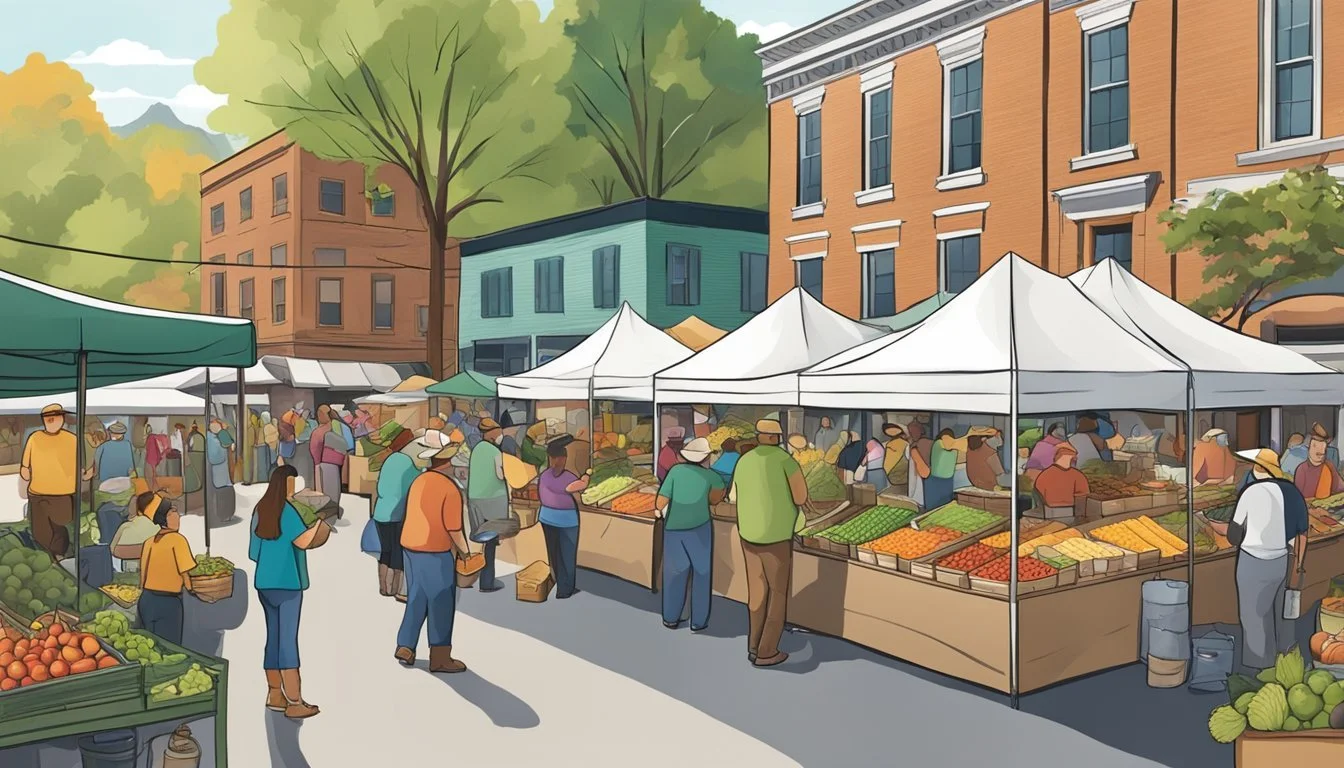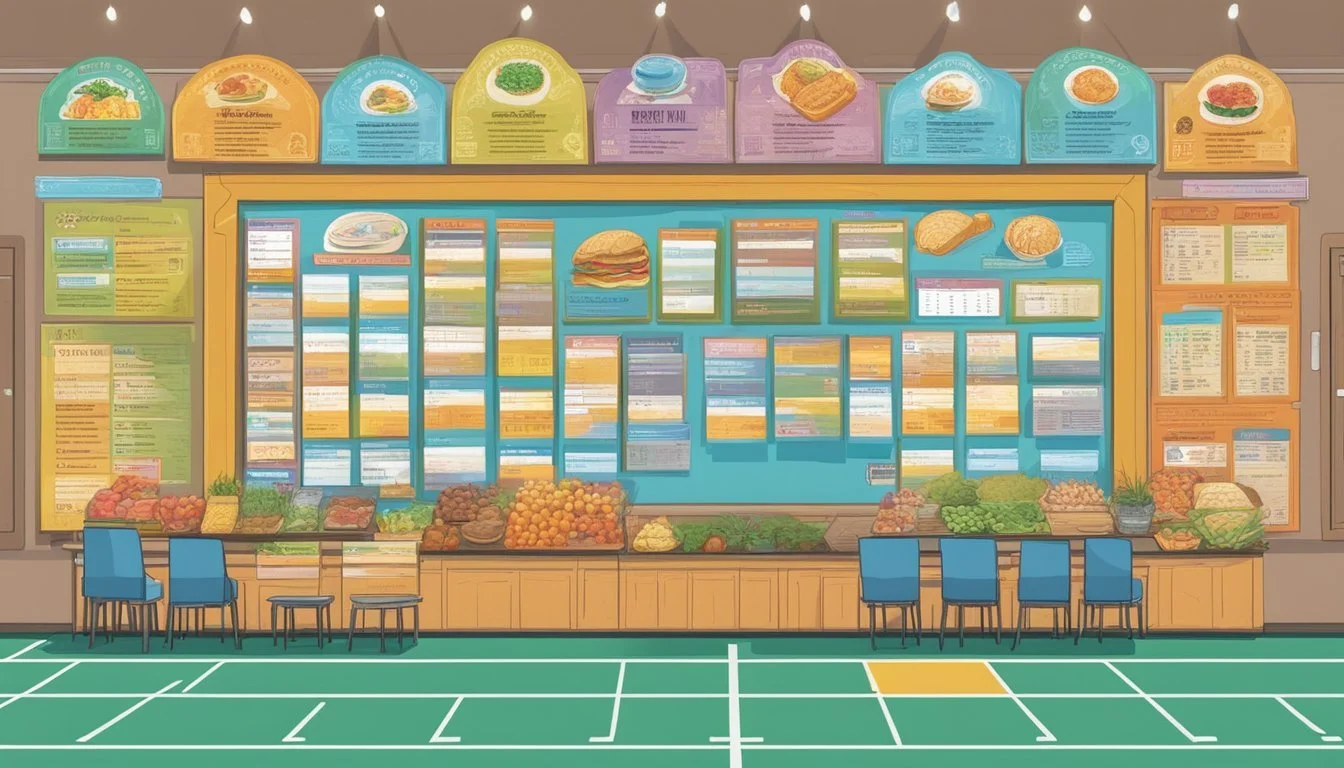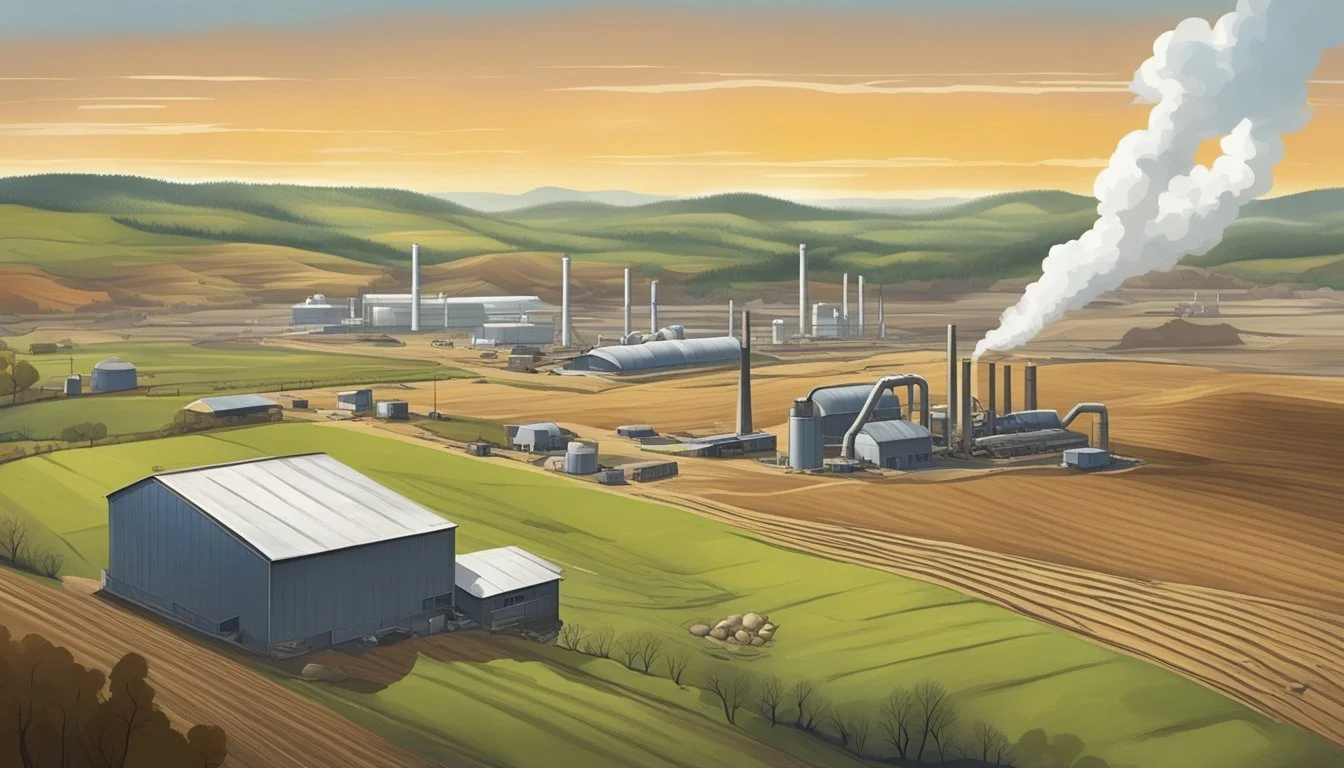West Virginia Food Challenges
Ultimate Guide to Mountain State's Eating Contests
West Virginia, known for its rich cultural heritage and rugged landscape, offers a unique tapestry of food challenges that reflect the state's love for hearty cuisines and friendly competition. These challenges are not just tests of one's capacity to consume large quantities of food but also serve as attractions that draw visitors and locals alike, all eager to test their limits or simply enjoy the spectacle. They range from spicy pepperoni roll contests to monstrous burger battles, each providing a glimpse into the state's culinary diversity.
Throughout the state, restaurants and festivals host these food challenges that often capture wide attention. Events like the West Virginia Three Rivers Festival Pepperoni Roll Eating World Championship epitomize the spirit of these contests by combining local traditions with the thrill of competition. It's not just about winning; it's about community, perseverance, and celebrating West Virginia's gastronomic offerings. Enthusiasts can keep tabs on upcoming events and partake in the challenge that best suits their tastes and capabilities, whether it involves cupcakes, hot dogs, or the mighty Goliath Burger.
Food challenges in West Virginia also symbolize the contrast within the state — moments of excess juxtaposed against the backdrop of challenges such as food insecurity. Despite the growing demand for basic sustenance, as reported by organizations like the West Virginia Center on Budget and Policy, these contests offer an avenue to highlight the broader food-related issues the state faces. Through community engagement and awareness, these gastronomic feats thus serve a purpose beyond entertainment, driving the point home about the importance of access to food for all West Virginians.
Historical Context of Food Challenges in West Virginia
West Virginia has long faced food challenges rooted in both economic and geographical constraints. Historically, the state's mountainous terrain and limited infrastructure have made the distribution of food notably difficult, contributing to food deserts where access to fresh, healthy food options is scarce.
During the early to mid-20th century, coal mining became the dominant industry in West Virginia. Miners and their families often lived in remote areas, far from grocery stores and markets. Thus, the reliance on preserved foods became common. One iconic food that emerged from this era is the pepperoni roll. Created as a convenient meal for miners, it has since become a cultural staple and inspired competitive pepperoni roll eating contests.
Moreover, as a reflection of community spirit and local tradition, food eating competitions such as hot dog eating contests have made their mark in West Virginian festivals and events. These contests highlight a resilient community finding camaraderie through local cuisine despite facing ongoing economic and food access challenges.
The food challenges in West Virginia are intertwined with the state's economy, culture, and history. They reflect the broader issues of food insecurity and the innovative responses of the communities living there. While competitive eating contests bring light-hearted entertainment, they also serve as a reminder of the state’s unique culinary heritage developed through overcoming practical adversities.
Major Food Challenges in West Virginia
West Virginia boasts a range of unique food challenges demonstrating both culinary skill and appetite. These gastronomic contests draw competitors and spectators alike, all eager to witness or take part in the battle against towering portions.
The 3.5 Lb. Hot Dog Challenge
At Hillbilly Hot Dogs in Huntington, the Homewrecker Hot Dog Challenge daringly awaits those who can stomach a colossal 3.5 lb. hot dog. This giant offering is not just about size but also about spice, testing the participant's ability to handle a fiery feast.
The 2.5 Lb. Burger Challenge
The Mason Jar Restaurant in White Sulphur Springs throws down the gauntlet with their hefty 2.5 lb. Burger Challenge. It's a towering triple decker burger that demands both strategy and a considerable appetite to conquer.
The Pepperoni Roll Challenge
The West Virginia Three Rivers Festival takes pride in their Pepperoni Roll Eating Contest, held on June 3. This contest honors the state’s signature snack, challenging contenders to consume as many pepperoni rolls as possible, turning a local favorite into a competitive endeavor.
Additional Noteworthy Contests
Beyond these notable challenges, West Virginia offers a variety of other eating contests. These include battles against stacked sandwiches, monstrous milkshakes, and colossal cookies, where the only thing larger than the portions is the pride in finishing them.
Food Challenges and Community Impact
West Virginia's efforts to tackle food insecurity highlight innovative strategies engaging local businesses and community volunteers. These initiatives aim to provide accessible and healthy food options to areas affected by food deserts.
Supporting Local Businesses Through Contests
The Mason Jar Restaurant in Fairmont, West Virginia, exemplifies local efforts by participating in contests that rally the community to support home-grown establishments. By leveraging local produce in their dishes, these contests not only stimulate the economy but also foster community food security.
Challenges Promoting Food Access Initiatives
Initiatives such as those of the Food Justice Lab at West Virginia University are instrumental in conducting research to understand and address food challenges. Their work often leads to the development of initiatives that aim to improve food access throughout the state, particularly in rural areas.
Prominent Sponsors and Organizers
Entities such as the Ali Baba Restaurant have become synonymous with community outreach in Morgantown, acting as both sponsors and organizers of events for food justice. This restaurant, alongside stories which immortalize regional lore like "Ali Baba and the 40 Thieves", illustrates the creative union of cultural heritage and food access advocacy.
Economic and Social Aspects of Food Challenges
In West Virginia, food challenges are deeply intertwined with the economy and social fabric of the state, affecting diverse groups including families, children, and local businesses.
Impact on Local Economy
Economic fallout from food challenges in West Virginia is profound, with both immediate and long-term ramifications. Families grappling with poverty often have to prioritize basic needs, which can result in constrained spending elsewhere, impeding local economic growth. Grocery stores that are considering setting up shop face potential obstacles like reduced revenue prospects, especially in rural areas that are already contending with limited transportation options and a low population density. This not only affects the availability of food but also the creation of jobs and the stimulation of local economies, perpetuating a cycle of economic stress.
Contributions to Community Cohesion
Food challenges hold a substantial influence on the community cohesion within West Virginia. The act of sharing meals and accessing nutritious food plays a crucial role in bringing the community together. However, when families and especially children face food insecurity, it creates social disparities. Community efforts to address food insecurity, such as local food banks or agricultural collectives, become integral to fostering a sense of unity and support among residents. They help in reinforcing communal bonds and contributing to the social health of the community. Moreover, initiatives designed to combat food challenges can empower residents, creating a spirit of collaboration and mutual assistance in both urban and rural communities across West Virginia.
Food Challenges and Nutrition Awareness
West Virginia's culinary scene includes numerous eating challenges that test the limits of both locals and visitors alike. From burgers to wings, these competitions often highlight the state's hearty fare. However, alongside these indulgent contests, there is a growing focus on nutrition awareness and the availability of healthy food choices.
Nutrition Assistance Programs play a critical role in the state. Initiatives like SNAP provide vital support, enabling access to nutritious foods for those facing food insecurity. Food pantries also supplement efforts to curb hunger, often with bipartisan support, exemplifying a unified commitment to a robust food system.
Agriculture in West Virginia contributes to nutrition awareness by promoting local produce. Efforts to address food deserts lead to improved availability of fresh fruits and vegetables, critical in preventing health issues such as diabetes. Community-supported agricultural programs and local farmer's markets are platforms for nutrition education and healthier food choices.
Challenge Type
Eating Competitions
Nutrition Programs
Agricultural Initiatives
Local Impact
Cultural Engagement
Food Access
Economic Support
Health Consideration
Moderate Indulgence
Balanced Diet Emphasis
Fresh Food Provision
These food-related initiatives reflect the balance between enjoying local culinary traditions and nurturing a healthy community through informed food choices. The state's approach typifies the importance of a comprehensive food system that entertains yet sustains.
Food Insecurity and Assistance Programs in West Virginia
This section focuses on the prevalence of food insecurity in West Virginia and outlines the initiatives in place to combat this challenge, especially during challenging times such as the COVID-19 pandemic.
Overview of Hunger and Poverty
West Virginia grapples with significant food insecurity issues, stemming from a complex interplay of hunger and poverty. It is reported that 15.1% of households in the state have experienced food insecurity, correlating with high poverty rates. Children and families are the most affected, with limited access to nutritious food undermining long-term health and well-being. The situation is exacerbated in rural areas where transportation barriers further restrict food access. Initiatives like the Mountaineer Food Bank and various food pantries work tirelessly to reach those in need.
Assistance programs, often supported by federal and state funding, aim to provide nutrition assistance through several mechanisms. For instance, the West Virginia Feed to Achieve Act is a state-supported program striving to improve food security among school children. Moreover, charitable organizations receive funding to support their operations, aiming to reduce the hunger gap across the state.
Response to the COVID-19 Pandemic
The COVID-19 pandemic has introduced additional challenges in mitigating food insecurity in West Virginia, with elevated unemployment and school closures disrupting regular meal patterns for many families. However, assistance programs such as the Supplemental Nutrition Assistance Program (SNAP) have seen a significant increase in enrollment, indicating a proactive response from lawmakers and assistance programs. They have been advocated for an increase in the maximum SNAP benefit by 15 percent to better respond to the rising food assistance needs as a result of the pandemic.
These measures, coupled with the dedicated efforts of food banks and local organizations, represent a multifaceted approach to ensure that residents of the state have the resources needed to navigate through and beyond the pandemic.
Legislative Measures and Public Response
In addressing the food challenges in West Virginia, state lawmakers have explored various legislative measures to combat hunger and improve food access. Notably, suggestions include establishing a state-level office dedicated to coordinating county food system efforts and addressing transportation issues that hinder food delivery to remote areas.
Public response to legislative action has been vocal. Advocacy groups have emphasized the critical nature of tackling food insecurity and have actively engaged with the state’s agriculture sector to push for change. Both the Mountaineer Food Bank and Facing Hunger Foodbank, key players in this space, serve hundreds of thousands of residents annually, highlighting the urgent need for collaboration between public initiatives and private organizations.
Initiatives under consideration:
Creating state-focused offices to tackle hunger;
Enhancing transportation infrastructure to improve food delivery;
Supporting agricultural programs to boost local food production;
Extending and increasing benefits for food assistance programs.
The public’s appeal for an increase in the maximum SNAP benefit by a significant percentage points to a recognition of the program’s impact amidst the pandemic. The rise in SNAP enrollment is indicative of an escalating crisis that demands robust policy interventions.
In summary, West Virginia’s approach to food insecurity involves multi-faceted measures that require continued public engagement and legislative willpower to foster a resilient and accessible food system.
Profiles of Food Challenge Winners and Records
The landscape of food challenges in West Virginia is marked by impressive feats and considerable cash prizes. Contest enthusiasts and professional eaters alike flock to the state to test their skills and speed against hefty meals and the clock.
Record Breakers and Celebrity Contestants
Miki Sudo, a household name in the competitive eating circuit, has competed in numerous contests across the nation, including those in West Virginia. Known for her ability to out-eat the competition, Sudo continues to hold records and titles across various food challenge categories. Meanwhile, local events often highlight rising stars who make their mark in towns like Bridgeport and Hurricane.
Hailing from Los Angeles, celebrity contestants occasionally drop in to try their luck at West Virginia's food challenges, often bringing with them a level of competition and entertainment that draws a significant crowd.
Notable Prize Pools in West Virginia
Competitions in West Virginia not only test one's limits but also offer motivations in the form of substantial prize pools. For instance, Stuarts Smokehouse in Alderson has provided challenges with prizes of $250 for the winner, while smaller awards of $100 and $50 are also common to encourage broader participation.
In cities like Hurricane, eating challenges have gone so far as to offer $500 to the champion, cementing the state's reputation for not only challenging the stomach but also rewarding the wallet. These prize pools contribute significantly to the excitement and draw of the competitive eating scene in West Virginia.
Future of Food Challenges in West Virginia
The landscape of food challenges in West Virginia is subject to several future trends that may impact the state’s ability to provide healthy food options for its residents. Critical attention is directed toward initiatives addressing these challenges, with entities like West Virginia University (WVU) and its Food Justice Lab engaging in rigorous research to strategize solutions.
These institutions aim to fortify community support systems by cultivating partnerships with local stakeholders. They undertake studies that inform policy on how to enhance food access and secure nutritional resources for West Virginians. The findings are pivotal in shaping interventions and crafting initiatives to mitigate the effects of food deserts and bolster food security.
Moreover, the emphasis on food justice underscores the necessity to analyze not only the economic but also the socio-cultural dimensions of food insecurity. The implications of WVU's research suggest that multi-faceted, contextually aware strategies are instrumental for future advancement.
Key Entity
Community Support
Initiatives
WVU
Food Justice Lab
Research
Future Trends
Role in Addressing Future Food Challenges
Provides a robust foundation for grassroots initiatives and interventions
Drives innovative programs and policy development
Serves as a hub for research and advocacy
Conducts interdisciplinary studies to recommend actionable solutions
Informs evidence-based strategies to combat food insecurity
Shapes the focus and methods of interventions based on emerging data
The approach is to adapt and evolve in alignment with future trends—anticipating changes in demographics, climate, and the economy that may present new hurdles or opportunities.
West Virginia’s path forward is collaborative and headlined by academic contributions and active community engagement. These elements serve as the bedrock for a future where addressing food challenges is not just an aspiration but an attainable goal.
Conclusion
West Virginia faces significant food challenges that significantly impact its communities. The presence of food deserts and the high rates of food insecurity reveal a troubling picture of access to healthy food within the state.
Community Impact:
The effects on West Virginians are profound, with food insecurity influencing a range of outcomes from health to educational achievement. Challenges include:
Limited access to grocery stores in rural areas.
High poverty rates affecting the ability to purchase nutritious food.
Transportation barriers that complicate food access.
Future Outlook:
Efforts to mitigate these challenges are emerging. West Virginia's utilization of food hubs and local food initiatives show promise. Key areas of focus include:
Enhancing local food production to reduce dependence on distant food sources.
Improving infrastructure to bridge the gap between rural areas and food providers.
Encouraging retailers to establish their businesses in under-served areas.
It is evident that addressing food insecurity and food desert issues in West Virginia requires a holistic approach, taking into account the unique geographical and economic factors that define the state. By supporting local agriculture and improving distribution networks, there is potential to not only alleviate current food challenges but also to bolster West Virginia's resilience in facing future food access concerns.









